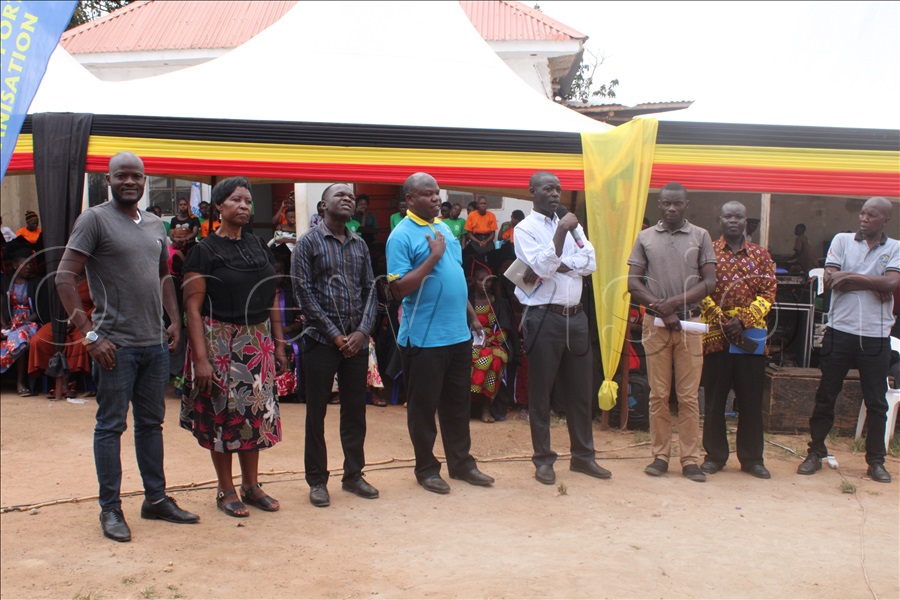TASO graduates 200 adolescent mothers in Mayuge
Ritah Mukasa
Journalist @New Vision
On Friday, September 16, over 200 girls graduated at St. Pius vocational training center located in Wakalende village, Mayuge town Council in Mayuge district.
These include adolescent mothers and those that do not have children but are out of school.

TASO And UDHA officials at the event. Photos by Ritah Mukasa
They got skills including; hairdressing, tailoring, catering and knitting.
The girls were between 16-24 years and are beneficiaries of the Adolescent Girls and Young Women (AGYW) programme, which is funded by the Global Fund.
The Aids Support Organization (TASO) implements it in partnership with Uganda Development and Health Associates (UDHA).

The project has been running since 2018 and targets vulnerable girls between 15-24 years who are out of school.
Dr. Charles Ngobi, the Monitoring and Evaluation (M&E) manager with TASO said the program is part of the HIV preventive measures intended to protect girls from getting the virus.
New ones are enrolled every after six months.

Pius Seggonga (Right) with the mentors of the girls.
So far, over 8,000 girls in 20 districts across the country have benefitted.
Other courses include; carpentry, motorcycle repair, motor vehicle mechanics, construction, electronic repair, plumbing and electric wiring.
They are trained for three months and after, they do industrial training for six weeks before getting certificates from the Directorate of Industrial Training, which is under the Ministry of Education.
On the graduation day, they receive equipment and materials to enable them to start and sustain their businesses.
For example, those who graduated in tailoring were given sewing machines and stools. The hairdressers received trollies, rollers, jerry cans and other accessories.
However, other girls are given soft skills of making liquid soap, jewellery, bags, baskets and shoes. They are trained for five to 10 days.
“The project targets vulnerable girls because they face many challenges that expose them to HIV,” Ngobi asserted.
However, even those with HIV are enrolled and guided on how to live positively and improve their livelihoods as well.
Ngobi added that the COVID-19 lockdown worsened the situation. Many young girls conceived while others were married off. They too needed help.
“A recent report from Uganda Aids Commission shows that out of every five adolescents who get HIV, four are girls. This compels us to protect and empower these girls,” he explained.
Ngobi highlighted that many beneficiaries have established businesses while others are employed in the industrial sector.
For example, NYTIL Company in Jinja has so far employed over 100 tailors.
Relatedly, Jackson Bagabirwa who represented UDHA Executive director said that of the 200 students they enrolled, none dropped out of the course.
Fred Mukwata, the project officer with UDHA added that the beneficiaries are selected from different villages with approval from Local councils and parents.
“The process is transparent. We target the most vulnerable teenage mothers, single mothers and those out of school but still with their parents,” he explained.
The girls are then put in the nearest training centers under female mentors who educate them on issues concerning HIV prevention and treatment, Gender Based Violence (GBV), sexual and reproductive health, family planning and hygiene.
They are also trained to make re-usable sanitary pads.
Pius Seggonga, director of St. Pius training center, said the vocational training center started in 2018 and has trained close to 1,000 girls with support from government, TASO and UDHA.
Elsewhere, Ngobi says, the project beneficiaries are spread in the districts including; Jinja, Kaliro, Iganga, Mayuge, Busia, Tororo, Buyende and Buvuma. Others are Hoima, Buliisa, Kyankwanzi, Kiboga, Nakaseke and Buikwe.
In addition, Nakasongola, Kitgum, Mbale, Dokoro, Pader and Bukwo have benefitted.

No Comment